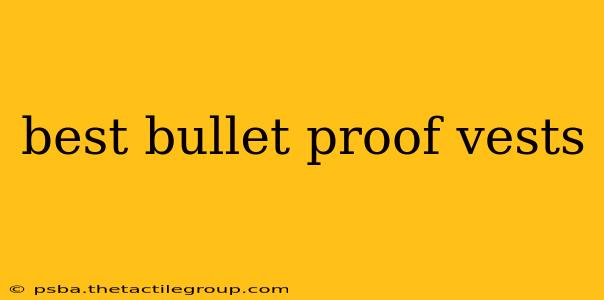Choosing the right bulletproof vest is a critical decision, impacting personal safety and potentially life-saving capabilities. This comprehensive guide explores the factors to consider when selecting a vest, examines the top contenders in various categories, and provides insights into maintenance and legal considerations. This information is for educational purposes only and shouldn't be considered professional advice. Always consult with law enforcement or security professionals for specific recommendations.
Understanding Bulletproof Vest Types and Materials
Bulletproof vests aren't a one-size-fits-all solution. They come in various types, offering different levels of protection against different threats. The primary materials used are:
-
Aramid Fiber (Kevlar®): A widely used synthetic fiber known for its high tensile strength and ability to absorb impact energy. Many entry-level and mid-range vests utilize Kevlar®.
-
UHMWPE (Ultra-High Molecular Weight Polyethylene): This advanced material offers superior protection compared to Kevlar®, often found in higher-threat vests. It's lighter and more flexible, but typically more expensive.
-
Ceramic Plates: These hard plates are designed to stop high-velocity rounds, typically used in conjunction with soft armor vests. They offer superior protection against rifle rounds but add significant weight.
-
Composite Materials: Modern vests often incorporate a combination of materials for optimized performance. This layered approach balances weight, flexibility, and protection levels.
Key Factors to Consider When Choosing a Bulletproof Vest
Several critical factors influence the choice of a bulletproof vest:
-
Threat Level: This is paramount. What type of threat are you preparing for? Handguns? Rifles? The vest's protection level (e.g., NIJ Level IIA, II, IIIA, III, IV) directly relates to the threat it can withstand. NIJ (National Institute of Justice) standards provide a standardized rating system.
-
Weight and Comfort: Bulletproof vests can be heavy and uncomfortable, especially during prolonged wear. Consider the weight and breathability of the vest, particularly for everyday use.
-
Size and Fit: A properly fitted vest is crucial for optimal protection and comfort. An ill-fitting vest can compromise its effectiveness.
-
Cost: Bulletproof vests range significantly in price, depending on the materials, protection level, and features.
-
Features: Consider additional features such as concealability, comfort features like moisture-wicking materials, and additional protection for the neck and groin.
Top-Performing Bulletproof Vest Brands (General Overview - No Specific Product Endorsements)
Numerous reputable manufacturers produce bulletproof vests. Researching brands with a strong history of meeting NIJ standards and positive user reviews is crucial. Look for manufacturers that provide detailed specifications and testing data for their vests. Remember that specific product recommendations are best obtained through consultations with security professionals.
Maintaining Your Bulletproof Vest
Proper maintenance is essential for preserving the effectiveness of your bulletproof vest. Manufacturers usually provide specific cleaning and care instructions, which should be followed diligently. Regular inspections for damage or wear are crucial. A damaged vest is compromised and offers reduced protection.
Legal Considerations
The legality of owning and carrying a bulletproof vest varies depending on location and circumstances. Some jurisdictions have restrictions or require permits. Always check local and state laws before purchasing or carrying a bulletproof vest.
Conclusion
Selecting the right bulletproof vest is a complex process requiring careful consideration of numerous factors. Understanding the different types of vests, materials, and protection levels is crucial. Prioritizing safety, consulting with professionals, and complying with all relevant laws are paramount in ensuring the vest provides the intended protection. Remember that this information is for educational purposes and should not be substituted for professional security advice.

